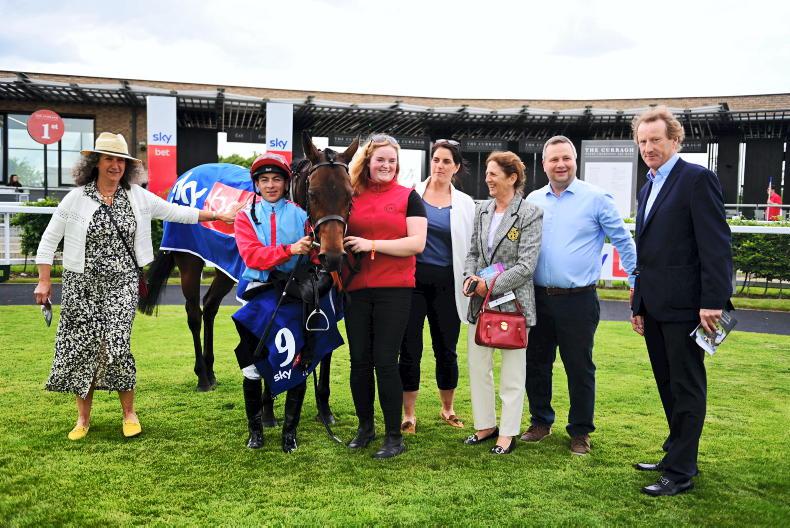How did you get into racehorse ownership?
We got into ownership through our interest in breeding of racehorses as we like to retain a homebred filly every year to put into training.
James’ parents started with point-to-pointers and hunting which we see as the origins of the industry.
What was your best day at the races and why?
Our most memorable day at the races was the day Siringas won at Gowan Park by 14 lengths first time out (August 31st 2000). She was our first retained homebred and she was trained by Jim Bolger. She set the bar very high but we have enjoyed seeing her progeny run including Grammata, a granddaughter who was listed placed for us two years ago.
What is the biggest drawback about being a racehorse owner?
The drawbacks are very few. We are lucky because as owner-breeders the costs are easier for us to absorb.
In your experience, which racecourse in Ireland treats owners the best and why?
I don’t think I can single out any racecourse in Ireland for preferential treatment as they all have such a unique atmosphere. From Killarney to Naas, Dundalk to Listowel, we have always been well looked after.
Flat or jump racing, which do you prefer and why?
I love flat racing and enjoy watching the progeny of our mares running all over the world. I also enjoy following horses that we have sold over the years.
Jump racing is a great spectacle and both provide great entertainment for everyone.
What qualities do you look for in a trainer?
I want a trainer to be passionate about racing and also to be a good communicator.
I am patient with horses and I hope this is a characteristic of any trainer we use.
What improvements would you like to see racecourses in Ireland do for owners?
I would like to see syndicated horses to have more of the names of the owners on the race card. I realise that this can be difficult but if they can do it in Australia why not here? It might encourage more people to take an interest in racing.
How do you think the current crisis will impact on racing in general and on ownership in particular?
As with everything at present, costs will have to increase. From fuel to transport, feed and wages, there doesn’t seem to be any escape from this reality.
What can trainers or HRI do to encourage owners to keep horses in training at the moment?
The best way to keep horses in training is to find some way for owners to share the costs and the way forward must be to encourage more people to join a syndicate.
That could mean that trainers need to be supported in this role as well. Assisting trainers access and use modern technology so that they can communicate with multiple owners would be a big help.
What significance do your colours hold?
My colours were picked by my sister Olivia Musgrave who, as an artist, has an eye for colour. In a world of green and gold, sometimes a red hat can be easy to spot.
I name my horses after villages and towns on the island of Syros in Greece, where my mother comes from, and I apologise to all the commentators who grapple with the pronunciation.
When buying a horse, what do you look for?
Good movement and correctness firstly followed by pedigree. They have to be an athlete. Temperament is also important but it is often the case that the best runners can be a bit hardy.
What horses do you currently have in training?
We have two fillies in training at present.
We have a few in partnership as well.
What’s next on the agenda?
We hope to run Ano Syra this Sunday at the Curragh, the three-year-old in training with John Feane, and we hope to try and get a bit of blacktype with her in the future.
The two-year-old, Ano Manna, is with Jim Bolger and it will be another few months before she see a racecourse.
Have you any young horses to look forward to?
We have a lovely full-sister foal to Ano Syra that we are very happy with.
What do you do with your racehorses when their racing days are over?
As we mainly race fillies the hope is that they will be good enough to come home to the farm and become broodmares. Helen Jones is our stud manager here.
What would help to make Irish racing more competitive for the smaller owner/trainer?
The prize money is good in Ireland and this is the best help for the small owners and trainers. The government will be under a lot of pressure due to the present crisis. HRI needs to keep the pressure on the government to maintain the present status of Irish racing. A lot of people are employed in all aspects of the horse business from point-to-pointing to the flat and all the subsidiary businesses in between.
What advice would you give to someone thinking of becoming a racehorse owner?
Start with a syndicate and become a small shareholder in a syndicate that might have a number of horses under its banner and go to as many of the race days as possible. It’s great fun.
Charlotte Musgrave was in conversation with Olivia Hamilton


 This is a subscriber-only article
This is a subscriber-only article
 It looks like you're browsing in private mode
It looks like you're browsing in private mode





SHARING OPTIONS: